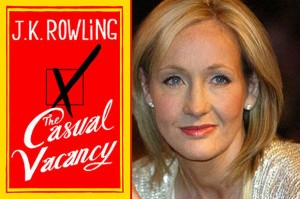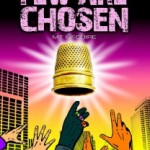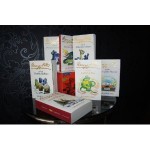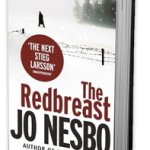 Having read Harry Potter to the kids (aged 7 and 9) last autumn and loving them every bit as much as the children did, I was eager to get my hands on Rowling’s adult for novels ‘The Casual Vacancy‘. ?I’ve read one or two reviews but didn’t want my opinion to be coloured by reading too many – have heard that there seems to be more negative than positive reviews out there and by the sounds of it, all are strong opinions whichever way they lean.
Having read Harry Potter to the kids (aged 7 and 9) last autumn and loving them every bit as much as the children did, I was eager to get my hands on Rowling’s adult for novels ‘The Casual Vacancy‘. ?I’ve read one or two reviews but didn’t want my opinion to be coloured by reading too many – have heard that there seems to be more negative than positive reviews out there and by the sounds of it, all are strong opinions whichever way they lean.
I enjoyed it, there was enough interest to keep the pages turning, however, I wasn’t tempted to put in an all-nighter reading it. When I read Harry Potter to the kids, there was times where they could scarcely sit still with excitement as they listened to me reading. Of course, this is a totally different genre, however, I expected something that was going to have be at the edge of my seat.
The first third or perhaps even half of the novel reminded me of a ‘Miss Marple’ novel – a death in a sleepy English village where the working class seemed rather dubious and while the middle classes had their flaws, it was unlikely any of them were murderers. In The Casual Vacancy however, it isn’t a murder but a death by natural causes that affects all the characters so much.
Rowling introduces so many characters to us in the opening chapters, I had to concentrate to remember who was who and work out how they were all related. ?It is clear that storylines will interweave and actions by some characters will affect others and so on. ?The characters are all interesting though, perhaps with the exception of Gavin, Mary, Mary’s children and Vikram. ?Having recently ploughed through The Captain’s Daughter by Leah Fleming (I’m stubborn/silly and rarely give up on a book) which also had an omniscient narrative style with multiple characters, I was struck by how much more powerful, well written and well rounded Rowling’s characters were – as I could feel genuine dislike, sympathy, disregard, sorrow and many other emotions – each of them held my interest and the writing was credible whereas in the other book, the writing was obvious if that makes sense.
One character remained ‘faceless’ in that we did not discover what he liked or hated, we did not have access to his inner most thoughts. Parminder’s husband, the talented surgeon Vikram, fancied by many characters, seen as talented and gorgeous and yet he was just in the background. I’m sure it was deliberate on Rowling’s part but I’m not sure why? ?Perhaps it was to serve as a contrast to her development of other characters?
I’d seen an interview with Rowling where she said the book was bleak, that characters weren’t particularly likeable and it did deal with the worst results of drug abuse and more. ?It wasn’t as bleak as I expected though. The worst and the best of human nature is exposed in this tiny middle class village which wants to expel its council housing estate and the addiction clinic that goes with it. ?The new social worker, Kay, fights a good cause for the addiction clinic by stating that without it, mothers on methadone would be feeding their addiction by returning to heroin, to prostitution and the result would cost society more as the children would have to be put in care. Comparing the cost of providing methadone to the cost of care for obese middle class tax payers is well done too.
I felt most affected by the chapters dealing with the teenagers – as it revealed the effects of bullying on facebook, of jeering in school, of jealous friends, of needless cruelty, of desperation actions seeking acceptance, of bullying and neglect by parents – it made me want to wrap each and every one of them up in cotton wool.
Does it have any similarities to Harry Potter? – well, the class war is similar, the threats, the bullying, the good characters trying to save the world. ?Harry’s Uncle Vernon and Howard Mollison seem quite similar – large, obese, cruel, middle-class men who use money and status as a vehicle to exercise their power. While the threats in Harry Potter are somewhat diminished as we read it as we know this ‘magic world of Hogwart and spells’ doesn’t exist except for in our minds, the threats in The Casual Vacancy, while not as scary and life-threatening as Voldemort’s spells, are actually much more threatening – after all, these are events that could play out in many small communities, over ?rivalries and class. ?Death can come to children from drug abuse, parental neglect, sexual abuse, self harm from bullying, and another child wondering what the result would be by giving a peanut to a child allergic to them.
The ending was somewhat like an Agatha Christie novel too to some extent, in that it was all wrapped up, everyone faced a resolution – some with death, some with moving away from Pagford, others with reconciliation with other characters. ?I was somewhat surprised by that – I was expecting it to leave us wondering more.
Have you read it yet? ?Let me know what you think?










